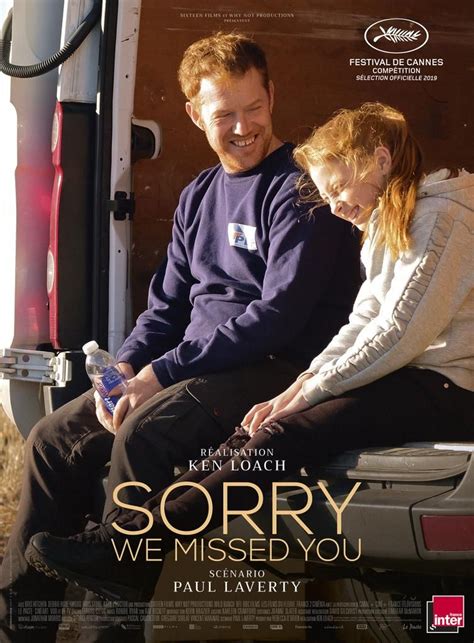Sorry We Missed You

Description:
Sorry We Missed You is a 2019 drama film directed by Ken Loach. The movie follows the story of a family struggling to make ends meet in modern-day England. With poignant performances and a powerful narrative, Sorry We Missed You sheds light on the harsh realities faced by working-class families.Keywords:
Gig Economy, Family Struggles, Economic Hardship, Social Realism, Worker ExploitationIs "Sorry We Missed You" sad?
Yes, "Sorry We Missed You" is a poignant and often sad film that explores the struggles of a working-class family in the gig economy. The story follows a father, Ricky, who becomes a delivery driver to improve their financial situation, but the pressures of his job strain family relationships and lead to emotional turmoil. The film highlights themes of economic hardship, alienation, and the impact of modern labor practices on personal lives, making it a deeply affecting and thought-provoking watch.
Is "Sorry We Missed You" based on a true story?
"Sorry We Missed You" is not based on a specific true story, but it reflects the real experiences of many workers in the gig economy. Directed by Ken Loach, the film portrays the struggles of a family in the UK, highlighting the challenges faced by delivery drivers and precarious workers. It captures the impact of economic hardship, labor exploitation, and the societal effects of a system that prioritizes profit over people, making it a poignant commentary on contemporary issues.
What happens at the end of "Sorry we missed you"?
At the end of "Sorry We Missed You," the family's struggles culminate in a heartbreaking scene. Ricky, the father, faces the harsh reality of his gig economy job as a delivery driver, which strains his mental health and family relationships. His son, Seb, gets into trouble, and the family's financial situation worsens. The film closes on a somber note, highlighting their ongoing challenges and the impact of systemic issues on working-class families, leaving viewers with a poignant reflection on sacrifice and resilience.
Why does UPS say "sorry we missed you"?
In the film "Sorry We Missed You," the phrase "sorry we missed you" reflects the challenges faced by the protagonist, Ricky, who works as a delivery driver for a logistics company. The title symbolizes the struggle of balancing work and family life, as Ricky's demanding job often leads to missed connections with his family, particularly his wife and children. The phrase captures the broader themes of the gig economy, the pressures of modern work, and the emotional toll it takes on individuals and their relationships.
Explore More Categories:
Survival Thriller Buddy Cop Cloning Conservation Military Dramedy Unexpected Human Survival Crocodile Vulnerability Autobiographical Drama Hysteria Gonzo Political Thriller Female Led Brooklyn Multiverse Biographical Documentary Tense Atmosphere Life Reflection Siblinghood Teen Romance Meta Horror Biographical Crime Drama German Film